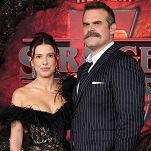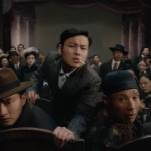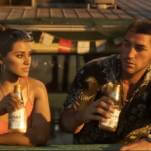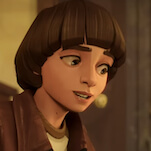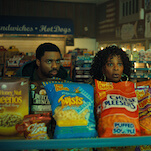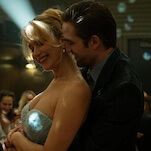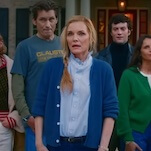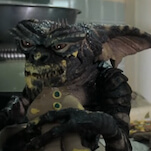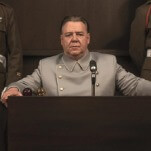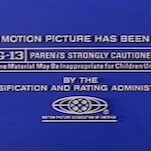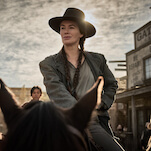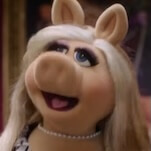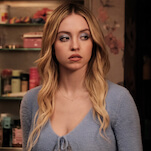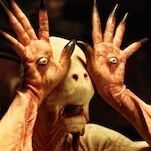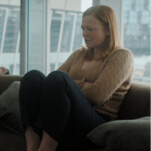The X-Files: “Red Museum” / “Excelsis Dei” / “Aubrey”

Looks like this is it, gang, our last entry before the grand hiatus. Much as I'd like to go out with a bang, the three episodes we're looking at today don't really allow for it. None of them are terrible, thankfully, but there's a disturbing lack of focus in all three that points to a series still unsure how to handle itself outside of its main pursuits. Everybody knows these days that X-Files stand-alone episodes are where it's at; but we tend to forget how in the early seasons, a lot of those stand-alones paled in comparison to the best of the mythology entries. There's a sense of creative uncertainty here that's frustrating to watch, as handfuls of plot and digression are tossed at the screen like so much uncooked spaghetti. Without the drive of "Erlenmeyer Flask" or "Duane Barry," episodes like "Excelsis Dei" and "Aubrey" come off as so much white noise. Well acted and occasionally thrilling white noise, but still fairly forgettable.
"Red Museum" tries the neat trick of combining what appears to be a MoTW ep with mythos; the results are intriguing, but not entirely successful. In a small town in the Midwest, teenagers are being kidnapped–they disappear for the night and are found wandering in the woods the next day, naked except for their underwear, with the phrase "HE IS ONE" (or SHE, gender depending) written in black marker on their backs. The kids have no memory of what happened to them, but the local sheriff has an idea. He thinks it's possession, and he blames a fervent vegetarian cult called the Church of the Red Museum for the attacks. See, the kids all live in cattle country, and the Church doesn't take too kindly to all that dead meat.
Enter Mulder and Scully. The first half of "Museum" has a lot of wandering, a lot of near incident, but not much in terms of story development. There are all sorts of possibilities raised, from the Church's "walk-ins" philosophy (new souls living in old bodies), to a former rancher's conviction that it's all about the injections of growth hormones the local cows get. This last idea isn't far from the truth; it's not growth hormones, though, but that nasty alien/human DNA concoction that we last got a taste of in "One Breath." Which explains the presence of the government agent that shot Deep Throat way back in "Flask."
Did I say these were forgettable? Here's the thing; I'm almost 100 percent positive I've seen all these episodes, but I couldn't have told you a damn thing about any of them. And I even remembered the basic plot of "Space." It's hard to pinpoint the problem with "Museum," but I think it has something to do with that divided focus; the mythology elements don't enter the picture till near the end, and it almost feels forced in, as though Carter originally wanted to do something with cannibalism but decided at the last minute to graft on a new thread. It's nice to see that creep agent return, even if it is for the last time, and the final twist on the Church cult–forcing the hostile townsfolk to take refuge at the Red Museum to save their children–is nice. Or it would be if the cult didn't seem like just a distraction to keep us from noticing that there's just not much going on here. Weird thing to say with a story this diffuse, but that's how it ultimately feels; a bunch of odds and ends cobbled together. (You could probably do a meatloaf pun here, but I'm too professional for that. Plus, I already made the spaghetti analogy, and you don't want to overuse your food metaphors.) I'll notch it up a grade because of the continuity, but even then, this one's definitely un-essential.
Continuing the trend of potluck plot, we've got a convalescent home full of whacked out elderly in "Excelsis Dei." The cold open sets the tone with a nasty attack scene: after dealing with lazy co-workers and a grab-happy old man, a nurse is set upon and raped by an invisible entity. Sexual assault is tricky subject for a show like X-Files, because the ugly real-world truth of the act is constantly at odds with the paranormal circumstances. "Dei" is no exception; while the rest of the episode is nowhere near as off-putting, the handling of the rape case left a bad taste in my mouth. There's the time spent trying to pass off the blame on the victim–it's done to send Mulder and Scully off the trail, and you never really believe the nurse was lying, but, again, there's that nasty reality peaking its head in. Mulder doesn't come off so well himself, as over and over he tries to dismiss Scully's suspicions due to his own skepticism about "ghost rape."
But the assault isn't the subject of the episode, merely a symptom of a larger problem. A number of patients at the home are Alzheimer's sufferers, but in the past few years they've made incredible progress beating back the disease. Initially suspicion falls on their doctor, whose been giving them experimental treatments; but the doctor is more than forthcoming with his research. There must be someone else out there who's been passing pills. Someone with access to the patients and a place to grow and produce his medicine.
"Dei"'s big reveal–that the old folks have been getting mushroom-based meds from Gung, the Malaysian orderly who lives in the basement–is a bit fuzzy. We're led to believe that the drugs have tapped into the spirits of the convalescent homes' former residents, which in explaining everything, explains nothing at all. "Dei" (and really all three of the eps this week) goes for mystery, but when the twist lands, there's no a-ha moment, no sense that all the pieces finally clicked into place. Instead, it has the reek of desperation, the result of a good hook with nothing to land. There's definitely potential here. A stronger push on the Awakenings-type tragedy that the older folks are going through could've been effective, but unlike the more sympathetic MoTWs we've seen, there's no effort here to connect with anyone besides Mulder and Scully. And given the respect the series has shown other cultures in the past, the off-handed manner in which Gung's motivations and history are handled is embarrassing. You don't even find out what country he's from till the final voice-over.
"Aubrey" starts out stronger; the mysterious visions and serial killers aren't breaking new ground, but the story is strung along in such a manner as to hold your attention. Terry O'Quinn is in one of the lead roles, which is always good news–he's an actor I'm always happy to see in just about anything. (If you haven't yet, do yourself a favor and track down The Stepfather.) A pregnant female cop is having bad dreams, and one of those dreams leads her to a skeleton buried in the middle of nowhere. That skeleton turns out to be the remains of an FBI agent who disappeared in the forties; the agent, Sam Chaney, is a legend at the bureau for being a pioneer in the field of psychological profiling. When he disappeared, he was investigating a series of murders in Aubrey, MI, murders with an MO that just happens to be repeating in the present day.
For most of "Aubrey," I was having a fun time. O'Quinn's character isn't particularly interesting, but I didn't mind, and watching Mulder and Scully work out clues to solve a fifty year-old crime was fun. Harry Cokely, the man responsible for the original killings, turns out to be an ugly old bastard with bad lungs and a worse facial rash. Initially, Mulder and Scully believe he's responsible for the 1942 murders and the current ones, which would be a bit of a trick considering his decrepit state. But then the two agents go to visit Cokely's one surviving victim, and they discover that she gave birth to Cokely's child; a child she considered the spawn of the devil and immediately put up for adoption.
